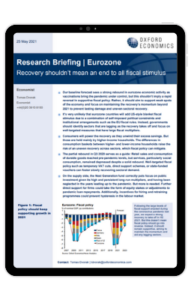Eurozone | Recovery shouldn’t mean an end to all fiscal stimulus

Our baseline forecast sees a strong rebound in eurozone economic activity as vaccinations bring the pandemic under control, but this shouldn’t imply a rapid reversal in supportive fiscal policy. Rather, it should aim to support weak spots of the economy and focus on maintaining the recovery’s momentum beyond 2021 to prevent lasting damage and uneven sectoral recovery.
What you will learn:
- It’s very unlikely that eurozone countries will add US-style blanket fiscal stimulus due to a combination of self-imposed political constraints and institutional arrangements such as the EU fiscal rules.
- Consumers will power the recovery as they unwind their excess savings. But those are held mainly by higher-income households.
- The partial rebound in Q3 2020 serves as a guide: Retail sales and consumption of durable goods reached pre-pandemic levels, but services, particularly social consumption, remained depressed despite a solid rebound.
Tags:
Related Services

Post
Eurozone: Little sign of harm from the Red Sea disruptions
The impact of Red Sea shipping disruption on the eurozone economy continues to be limited, in line with our baseline view. Our new Eurozone Supply Stress Indicator suggests that supply pressures have returned to normal following a period of easing in 2023.
Find Out More
Post
GCC: Key themes shaping city economies in the near term
For Gulf cities, the near-term outlook will be tied not only to the global macroeconomic backdrop, but also the progress of the diverse visions and strategies in the region. With the aim to diversify their economies and reduce the dependence on oil, Gulf states continue to invest in the non-oil economy and implement various reforms. That said, oil revenues remain key to funding diversification efforts.
Find Out More